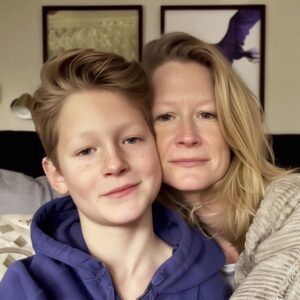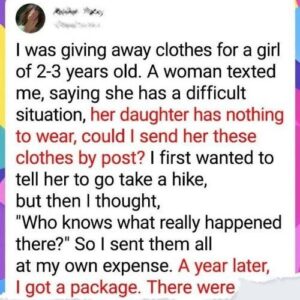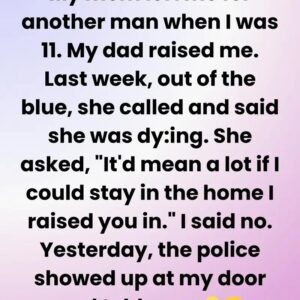I used to think nothing on our fridge could surprise me. It’s a gallery of five-year-old brilliance—rainbows with too many colors, cats with eight legs, stick-figure us holding hands under a sun that takes up half the sky. But the day Anna brought home her “family” drawing, a crayon knocked the air right out of my lungs.
I’m thirty-six, married, and for five years my world has revolved around one small person with a laugh that unknots the worst day. Anna is curious, relentless with questions, and endlessly inventive. My husband, Mark, is the kind of father who lets her cover his cheeks in glitter and prowls the house as a “sparkle monster.” We are not glamorous. We are steady. If you’d asked me a month ago, I would have said our life was warm and safe and exactly enough.
So when Anna’s teacher gave a simple assignment—draw your family—I didn’t think twice. Another masterpiece for the silver magnet. After school, she ran into my arms, vibrating with that contained excitement children have when they’re certain they’ve made magic.
“Mommy, I made you something special,” she whispered, clutching her backpack.
“Is it a castle? A puppy?” I teased.
“You’ll see.”
After dinner, she climbed onto my lap and unfolded her treasure. There we were—me, smiling, Mark, tall and waving, and Anna in the middle with pigtails like sideways exclamation points. And then my heart caught.
There was a fourth figure. A boy, the same size as Anna, hand in hers, smiling like he’d been there all along.
I kept my voice light. “Sweetheart, who’s this? Did you draw one of your friends?”
Her smile fell. The paper edged closer to her chest. “I… I can’t tell you.”
My own smile wobbled. “Why not? It’s just a drawing.”
She looked at the floor. When she spoke again, her voice was so small I had to bend to hear it. “Daddy said… you’re not supposed to know.”
A cold ribbon curled up my spine. “Not supposed to know what?”
The words burst out of her like she’d been holding her breath too long. “That’s my brother. He’s going to live with us soon.”
I opened my mouth, but no sound came. Pink rushed into her cheeks, and before I could reach for her, she ran down the hall and shut her door. The house settled into a heavy, humming silence. I stood at the counter, staring at that bright, impossible family of four.
Night is a terrible place to be with a half-truth. I lay awake, counting the seconds between Mark’s easy breaths. Every creak in the house felt like a crack opening. By morning I had made a decision. I braided Anna’s hair; I kissed Mark’s cheek and told him his tie was crooked. I smiled like a woman with nothing to question. And when they left, I started searching.
Mark’s office sits at the end of the hall, a neat space with too many binders and not enough light. He’s a creature of habit; the bottom desk drawer is his “catch-all.” I found tax returns, warranties, impatience. Then, buried under a stack of file folders, an envelope from a children’s clinic. My stomach tightened. Inside—an itemized bill. Patient: a boy I didn’t recognize. Age: seven.
I kept going. In our bedroom, behind his briefcase, a shopping bag: tiny jeans, dinosaur T-shirts, sneakers too big for Anna. In a jacket pocket—crumpled receipts: kindergarten fees across town, toys from stores we never visited, groceries my daughter never eats. Piece by piece, the picture hardened into shape, and it wasn’t imagination anymore.
I laid everything out on the dining table: the bill, the clothes, the slips of paper that told the story of a life I didn’t know. I placed Anna’s drawing in the center like a compass.
When Mark came home, he stopped in the doorway. His eyes flicked from the receipts to the shirts to me. Color drained from his face. “Linda…”
“Sit,” I said. My voice didn’t sound like mine. “Explain. Everything.”
He sat. For a long time, it was just the clock, counting out our marriage in seconds. He dragged a hand down his face. “I never cheated on you. Please believe that. I love you. I love Anna. I never—” His voice broke. He gestured at the evidence. “But this is true. Anna does have a brother. My son. His name is Noah.”
My fingers dug into the table. “You have another child?”
“Seven years ago,” he said, eyes fixed on the bills, “before I met you. I was with someone—Sarah. We split. I didn’t know she was pregnant. She never told me. She married quickly, and when her husband learned the baby wasn’t his, he left. She raised Noah alone. I didn’t know he existed until a few months ago.”
“Why now?” I asked, raw. “Why keep it from me?”
He finally met my eyes, and there it was—fear. “Noah got sick. He needed a blood transfusion. Sarah wasn’t a match. Neither were her parents. She found me. The tests… proved it. He’s mine.”
The medical bill, the clothes, the kindergarten tuition—they all slid into place. “So you’ve been seeing him. Paying for things. Behind my back.”
“I was terrified,” he said, reaching and stopping inches from my hand. “Afraid you’d think I was lying. Afraid you’d leave. I wanted to protect us. But I can’t abandon him. He’s my son. Which means he’s part of us, too.”
There are a hundred ways to be betrayed. Some shatter; some slice slowly. The worst, I learned, is the one that arrives with a child’s smile in the center of it. My anger was a living thing. But under it, a quieter truth settled: there is a boy who exists whether I like it or not.
“What happens now?” I asked. “Do you bring him here one day and we pretend this is normal?”
“No,” he said quickly. “We go at your pace. I will do whatever you need. But please—don’t make him pay for my cowardice. He is a good kid, Linda. None of this is his fault.”
I stared at the tiny T-shirt with the cartoon dinosaur and thought of Anna’s drawing, her brother holding her hand with the easy confidence of belonging. Our five-year-old had accepted a reality I hadn’t been given the chance to choose.
The weeks that followed were jagged. We fought with the exhausting intensity of people trying to rearrange the past. Some nights we sat in parallel silences that felt heavier than shouting. Trust, once cracked, doesn’t reseal on command. But paperwork moved forward, schedules were discussed, boundaries negotiated. And then, because delays can only sit so long in the way of a child, I met Noah.
He was smaller than I’d imagined, dark-haired, careful. He clung to Mark’s hand and watched me like I might be a test. I didn’t know what to do with my own hands. Then Anna barreled into the room and threw her arms around him. “My brother!”
Something unclenched in his face. A grin—Mark’s dimple, Anna’s spark—flashed. The anger didn’t vanish; it shifted. He wasn’t a secret. He was a person.
We began the slow work of weaving. Saturdays turned into Lego cities colonizing our living room. The sound of two laughs tangled in the hallway. At bedtime, they lay side by side, heads touching, listening to the same story as if it had always been for two. Sarah kept her distance but stayed steady, wanting what we wanted: a stable orbit for him. He lives with her, visits us regularly, and learned quickly that Anna hoards the blue crayons.
Time did what time does. The chaos softened into a new shape. Our dinners got louder. The fridge gallery made room for another artist. I still had moments where the old wound burned—when Mark’s phone buzzed and I remembered he had carried a truth alone, when a receipt in an old coat pocket dated those weeks in ink. But then Noah would show me a loose tooth like it was the moon, or Anna would tuck her arm through his without thinking, and my resentment had nowhere to stick.
One night I tucked them both in, the room smelling like shampoo and library books. They were a knot of limbs under a tangle of blankets—his stuffed dinosaur, her lopsided unicorn. I kissed Anna’s forehead. Her lashes fluttered.
“See, Mommy?” she murmured. “I told you he was coming to live with us.”
My heart stuttered. “Anna… who told you that?”
She was already drifting, voice thin with sleep. “My brother did. Before we met him.”
I sat there in the soft hush, watching two small chests rise and fall, and felt the floor of my life settle. We were not the family I thought we were. We were something else—messier, truer, bigger than the space I had planned for. Some stories you choose. Some arrive on your fridge in crayon and ask if you’re brave enough to make room.
I don’t know when the last of the anger will fade. I do know this: there is a boy in our hallway who laughs when the cat chases his shoelaces, and a girl who knew, somehow, he belonged before any of us did. And there is a marriage learning to tell each other the whole truth, even when it’s hard.
Sometimes family is a surprise you didn’t ask for, a picture with an extra hand reaching in. You can crumple it, or you can smooth it out and make a place for everyone to stand.





